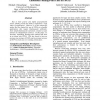Free Online Productivity Tools
i2Speak
i2Symbol
i2OCR
iTex2Img
iWeb2Print
iWeb2Shot
i2Type
iPdf2Split
iPdf2Merge
i2Bopomofo
i2Arabic
i2Style
i2Image
i2PDF
iLatex2Rtf
Sci2ools
103
Voted
FPGA
2006
ACM
2006
ACM
Embedded floating-point units in FPGAs
Due to their generic and highly programmable nature, FPGAs provide the ability to implement a wide range of applications. However, it is this nonspecific nature that has limited the use of FPGAs in scientific applications that require floating-point arithmetic. Even simple floating-point operations consume a large amount of computational resources. In this paper, we introduce embedding floating-point multiply-add units in an island style FPGA. This has shown to have an average area savings of 55.0% and an average increase of 40.7% in clock rate over existing architectures. Categories and Subject Descriptors C.4 [Performance of Systems]: Design Studies
Floating-point | Floating-point Multiply-add Units | FPGA | FPGA 2006 | Simple Floating-point Operations |
Related Content
| Added | 22 Aug 2010 |
| Updated | 22 Aug 2010 |
| Type | Conference |
| Year | 2006 |
| Where | FPGA |
| Authors | Michael J. Beauchamp, Scott Hauck, Keith D. Underwood, K. Scott Hemmert |
Comments (0)

